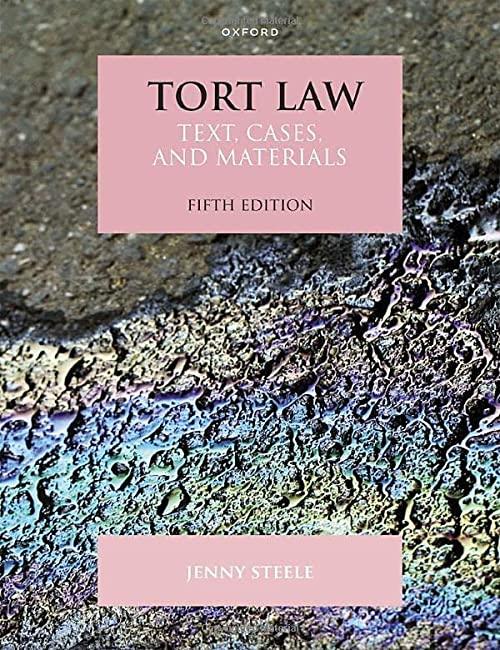Question
CASE STUDY Walker v. Eastern Hotel In this case, guests purchased tickets that were then used to obtain alcohol. Staff duties included the clearing of
CASE STUDY
Walker v. Eastern Hotel In this case, guests purchased tickets that were then used to obtain alcohol. Staff duties included the clearing of tables and serving of coffee, etc., but not the service of alcohol. Mr. Walker consumed considerable alcohol, was "cut off" by the property and after considerable persuasion by the event organizer, agreed to accept a ride home. Once in the parking lot, Mr. Walker suddenly changed his mind and drove off on his motorcycle. Minutes later he was involved in an accident.
The court found that "In providing a cash bar arrangement the hotel had effectively deprived itself of the opportunity to observe the guest and monitor if it was serving alcohol to an apparently intoxicated person, in breach of their duty under the Liquor License Act. Had there been table service by individual servers, the staff would have realized the pace of Mr. Walker's consumption and stopped serving him earlier." Alternately a limited number of tickets could have been sold to each guest, thereby controlling and restricting alcohol consumption. The court concluded, on the facts of the case that, "Service of alcoholic beverages via a cash bar eliminated the opportunity to monitor consumption and constituted Contributory Negligence on the part of the hotel."
The court found the Hotel 5% liable for Walker's injuries.
Question:
1.The facts (5 marks)
2.The issue(s) (5 marks)
3.The court's decision (1 mark)
4.The court's reasoning supporting the decision (3 marks)
5.Conclusion: Do you agree with the outcome? Why or why not?
Justify your answer (6 marks total)
a)Agree/not (1 mark)
b)Why or why not (2 marks)
c)Your own personal justification/rationale expanding on why or why not
(3 marks)
RUBRIC FOR CASE STUDIES
The Facts/The Issue(s): This shows a good understanding of facts and issues and the difference between them.
The Court's Decision/The Court's Reasoning supporting the Decision: Identifies the court's decision and explanation or reasoning on the legal question with considerable accuracy
Conclusion: Shows thoughtful and relevant commentary and critical thinking on the case. Makes relevant and logical connections to other similar situations.
Format and APA
Step by Step Solution
There are 3 Steps involved in it
Step: 1

Get Instant Access to Expert-Tailored Solutions
See step-by-step solutions with expert insights and AI powered tools for academic success
Step: 2

Step: 3

Ace Your Homework with AI
Get the answers you need in no time with our AI-driven, step-by-step assistance
Get Started


